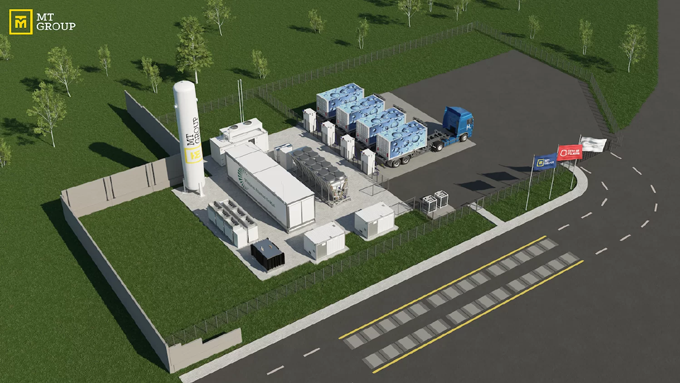
Vilnius takes a major step towards sustainable energy with the construction of a green hydrogen plant in the capital city. On 29 April, an approximately €10 million full-scope EPC contract was signed between Vilnius City Municipality, the largest centralized heat supplier in Lithuania Vilnius Heat Networks, and energy infrastructure development company MT Group, officially launching the plant’s development.
This project is a key part of Vilnius’ broader plan to create a sustainable urban transport system. The hydrogen produced at the facility will power 16 public transport buses, replacing diesel-fueled vehicles and cutting an estimated 1,414t of CO₂ emissions annually.
"Vilnius is becoming a Baltic leader in hydrogen energy. This project is more than just an infrastructure project. It is the city’s response to the climate crisis, a step towards a cleaner environment and a smarter transport system. The green hydrogen plant will not only produce sustainable energy, but will also help to reduce urban pollution,” says Vilnius Mayor Valdas Benkunskas.
The project is valued at approximately €10 million. Up to 70% of the funding will come from European Union structural funds, with the remaining costs covered by the Vilnius City Municipality.
“The plant is scheduled to begin operations in the first half of 2026. Using water and electricity from renewable sources, the facility will produce up to 3.45 million cubic meters of green hydrogen per year – equivalent to around 2,000 MWh of heat energy,” said Gerimantas Bakanas, CEO of Vilnius Heat Networks.
As Europe accelerates its transition to a climate-friendly economy, green hydrogen is increasingly recognized as a crucial, efficient technology for decarbonizing sectors where fossil fuels still dominate. MT Group plays an active role in this transformation, designing and implementing green hydrogen, renewable energy, and carbon capture infrastructure across the continent.
"This project represents a pivotal milestone – it proves how strategic goals and a clear political vision can materialize into real, functional infrastructure. The plant in Vilnius will meet the highest standards of quality, safety, and technological efficiency. We believe it will become a benchmark for urban hydrogen solutions for the whole region,” said Mindaugas Zakaras, CEO of MT Group. "We are confident in this project’s success and believe that close collaboration with the skilled team at Vilnius Heat Networks will allow us to achieve even the most ambitious goals,” added Mindaugas Zakaras.
MT Group is also a founding partner of the global Green Energy Park initiative – one of the world’s largest green hydrogen projects – aimed at producing cost-effective hydrogen to decarbonize industry and ensure Europe’s long-term energy independence.
Hydrogen technologies are being embraced globally – from Japan to the UK. Tokyo has cutting-edge hydrogen refueling stations, and hydrogen-powered buses are part of the public transport system in Aberdeen, Scotland. The UK is also running pilot programs using hydrogen for residential heating, replacing conventional boilers.
These examples demonstrate that Vilnius is on the right path, joining forward-thinking cities worldwide in adopting clean energy innovations and reducing dependence on fossil fuels. The new hydrogen plant will also support Lithuania’s national climate goals outlined in the country’s Energy Development Program for 2021–2030.
 KEYFACT Energy
KEYFACT Energy